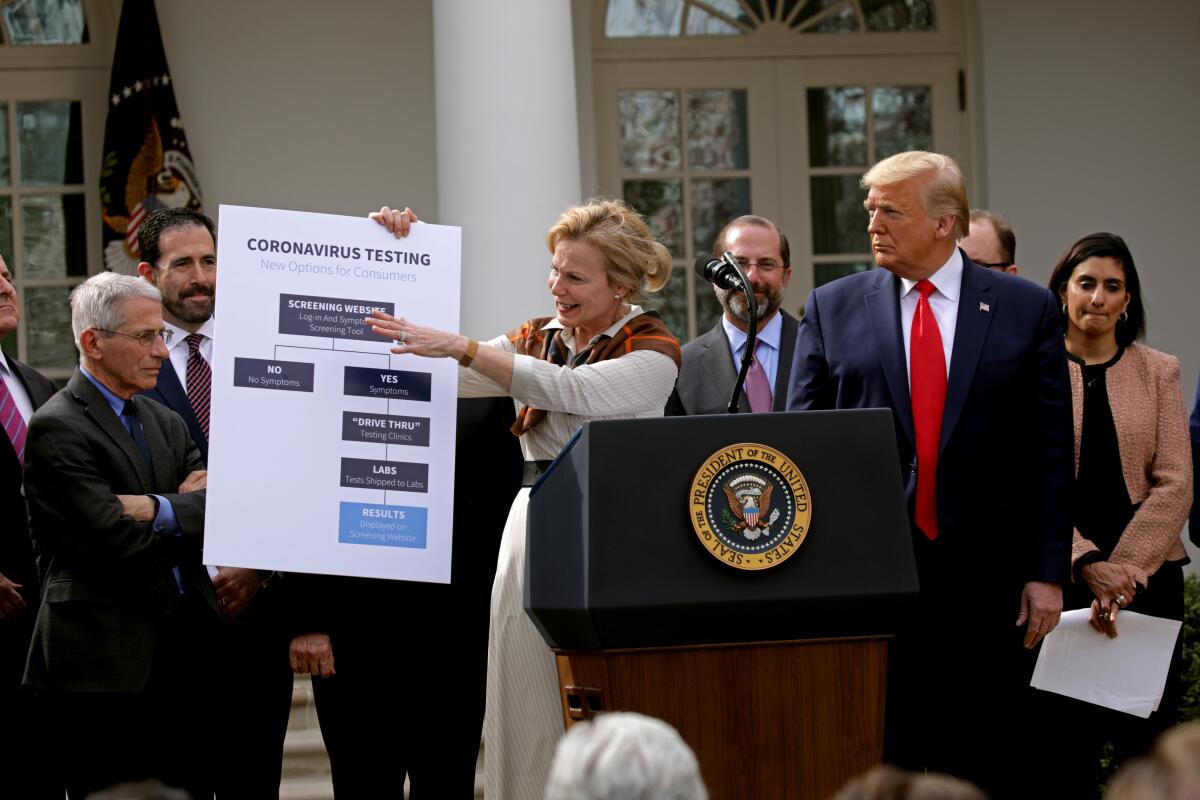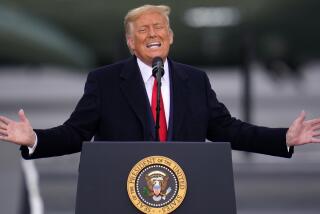Trump says he’s learned from the coronavirus. Let’s hope so.

WASHINGTON — In a crisis, Americans expect leaders to tell the truth about the problem, present a clear strategy to overcome it, and tell citizens how they can help.
We’ve seen plenty of that kind of leadership over the last few weeks as coronavirus became a pandemic.
We saw it from governors of both parties — Jay Inslee of Washington, Andrew Cuomo of New York, Mike DeWine of Ohio — who closed schools and banned large gatherings, including sports events and Broadway plays.
We saw it from business leaders who closed retail outlets and asked employees to work from home.
We even saw it from the National Basketball Assn.
One place we didn’t see much leadership was the White House. For weeks, President Trump downplayed the epidemic, promised it would end on its own, and claimed tests were available to anyone who wanted one. (They weren’t, and still aren’t.)
It seemed discordant that so many other leaders were grappling with the virus as a growing crisis, only to hear the president insist as late as Thursday: “We’re in great shape…. It’ll go very quickly.”
So it was a welcome change last week when the president finally offered a strategy for making widespread virus testing available, weeks after public health professionals began demanding it.
The details were still blurry. His only specific promise was that a Google-designed website would go up “very quickly.” Even that turned out to be only a beta version aimed at the San Francisco Bay Area.
Over time, Trump said, more tests will be available, thanks to the Swiss pharmaceutical giant Roche. Thank heaven for Swiss ingenuity! (Also for the scientists in the Bay Area, Germany and China who worked on the project.)
Let’s hope those plans work better than the initial testing program of the federal Centers for Disease Control and Prevention, which turned into an embarrassing — and potentially deadly — failure.
And let’s hope Trump’s promise on Friday comes true: “We will turn a corner on this virus … in a number of weeks.”
But even as we root for the president to succeed, we should also hope he learns some larger lessons:
Presidents don’t get a free pass if they fail to notice impending threats.
Trump has said several times that nobody knew a coronavirus could reach our shores. “It’s an unforeseen problem [that] came out of nowhere,” he said.
Except it wasn’t.
Every year, the director of national intelligence delivers a briefing on threats to national security. A warning about pandemics, including coronaviruses, has been part of that every year Trump has been in office.
If you want the federal government to be effective in a crisis, you need to give it the tools to act.
You’d think a Republican president from the business world would know that bureaucracies can be inefficient and slow-moving.
That’s why the Obama administration set up a White House office on health security in 2016 — to eliminate red tape and force feuding agencies to cooperate.
But in 2018, Trump’s then-national security advisor, John Bolton, abolished the office. When the coronavirus appeared in China last year, there was no White House health czar to coordinate a response.
“It would be nice if the office was still there,” Dr. Anthony Fauci of the National Institutes of Health said last week.
On Friday, Trump said he didn’t know anything about the office’s elimination. Asked whether he bore any responsibility, his answer was: “It’s a nasty question.”
Whether the president likes it or not, the buck still stops with him.
For weeks, Trump’s main message about coronavirus was that the problem was already under control — thanks, he said, to his decision to stop travel from China.
When it became clear that his messages weren’t true, he blamed others. He complained that the CDC had done “nothing meaningful … to fix the testing problem.”
For that problem, “I don’t take responsibility at all,” he said Friday. “We were given rules, regulations and specifications from a different time.”
But he didn’t explain why he and his aides did nothing to fix the problem.
Blame doesn’t belong exclusively to Trump. Other parts of his administration failed too.
But after more than three years in office, it’s his government now.
The real estate mogul who pledged to make the federal government work more like a business hasn’t kept that promise or even really tried.
“We’ve learned a lot,” Trump said Friday. If he wants to convince anyone, he needs to move beyond empty bluster and tell us what, if anything, he’s really learned.
More to Read
Get the L.A. Times Politics newsletter
Deeply reported insights into legislation, politics and policy from Sacramento, Washington and beyond. In your inbox three times per week.
You may occasionally receive promotional content from the Los Angeles Times.











